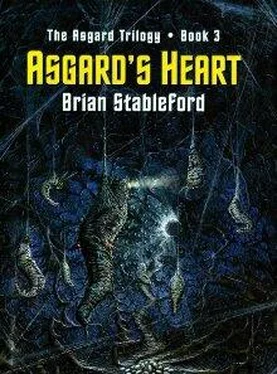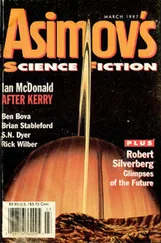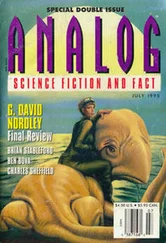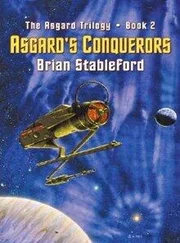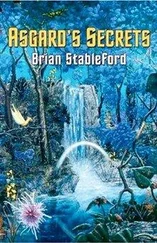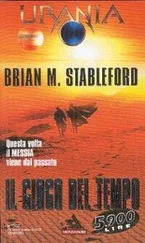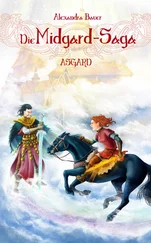I considered the two alternatives. They both had certain attractions. I couldn’t immediately see a way of deciding between them. Nor could I see any reason to suppose that they were the only two hypotheses that might be entertained.
“Can you think of any others?” I asked Nisreen.
“The game of speculation,” he parried, “can be played indefinitely. There are always more.”
“Tell me,” I said.
“It is outside the scope of my expertise,” he said.
“I don’t think this is an appropriate time to get coy,” I told him. “The guys back on Tetra will probably never know. You can be as wild as you like.”
“In that case,” he said, “we can multiply hypotheses simply by pushing the level of competition further and further back. We have imagined life based in an alternative organic chemistry. We have imagined pseudo-life based in the chemistry of other elements than carbon. If we are to exercise our imaginations more fully, we might attach the phenomena which are associated with life—replication, evolution, control of the environment—to things other than those transactions of atoms and molecules which we categorise as ‘chemistry.’ If there are to be no limits upon what we suppose, then we may babble about quasi-living systems and intelligences at the subatomic level, or at the level of the structuring of space itself. You have no doubt been told that if the fundamental constants of physics had other values than the ones they have now, life of our kind would be impossible. It is possible to speculate that those characteristics themselves are in some way open to manipulation— but at this point the imagination of beings like us is tested to its limit. I, at least, can no longer construct a coherent account of what might be going on.”
I remembered that what seemed to be happening in my dream was a failure of the imagination… an inability to get a grip on things. Maybe that was the reason. Maybe any story that Nisreen and I could think up must be false, for the simple reason that we had to make it make sense, and the reality didn’t. Maybe the answer was so peculiar that we couldn’t even formulate it—but maybe not so peculiar that it was beyond the imagination of an advanced software persona. Maybe the things that were fighting this grotesque war had reasons for doing so that we could never comprehend. Maybe even the Nine were too primitive and too stupid: mere godling cannon-fodder in a conflict which concerned them hardly more than it concerned us.
I remembered the end of the dream, and the other dreams, and the way in which a mythical framework of understanding kept imposing itself, incomprehensibly, upon what might well be attempts by the biocopy in my brain to help me figure out the what and why of things.
I tried to explain that to Nisreen—to tell him something about the ideas underlying Greek and Norse mythology—in order to ask him what dreams poor Tulyar might have had, and what vocabulary of symbols the Tetron mind might draw upon in parallel with my experiences.
“With us it is not the same,” he said. “Your present culture is a patchwork, made by the drawing together of many ancestral tribes which had different languages and different ways of thought, having dispersed geographically long before inventing agriculture and settling down. Your entire history is dominated by the idea of a small local tribe surrounded by aliens… by enemies.
“On Tetra, our ancestors discovered agriculture and settled down before dispersing geographically, so that our gradual colonization of the various regions of our world was more like the growth of a single culture. In time, we developed different languages and other cultural differences, but our history has always been dominated by the idea of one tribe, changing and diversifying. You see the influence of this idea in our resistance to exaggerated individualism, and in our habit of numbering ourselves within our name-groups. Not until we began to travel among the stars did we find ourselves to be one tribe among many, and we have always been concerned to bind the galactic community together as a great whole, uneasily aware that it might be impossible or inappropriate to do so. That is why we take such an interest in theories of history and researches in biology that credit all the galactic humanoids with a common ancestry of some kind.
“In terms of our mythology, we were always monotheists. A single tribe very quickly produced the notion of a single god. That idea, in its turn, gave way fairly readily to the notion of a universe that, although godless, is law-governed and ordered as a great machine. Our historical scientists believe that is why the Tetrax are the most scientifically-advanced race in the galactic arm, although we are no older, in evolutionary terms, than any other.
“We have nothing in our cultural and mythological heritage which resembles the complicated notions of your ancient Greeks or Norsemen—the idea of Gotterdammerung would be entirely alien to us. We have not even the kind of covert dualism that is built into your supposedly monotheistic religions, which oppose a law-making god with an adversary or a subversive chaos. It may be, I think—for reasons which are purely accidental—that you have far better resources in the imagination for representing what seems to be going on around us than 994-Tulyar had. It may be that coincidence has helped to model your mythical thinking on a pattern which really is reproduced in the universe, in a conflict of godlike beings with which we have somehow become entangled.”
My head was beginning to ache again, but not with the effort of thought. What Nisreen had said was fascinating in more ways than one. One of the ways in which it was fascinating was that it might help to explain why I was being fitted up by fate to take a part in whatever was going on around us. It suggested that there might be something about the human mind—as moulded by its historical and cultural heritage—which enabled it to adapt to the context in which the war inside Asgard could be seen to have meaning. It suggested, in fact, that my other self, copied and encrypted by the Isthomi and then sent forth upon his heroic quest through Asgard’s other dimensions, might indeed be enabled to achieve something which no other humanoid could do as well.
For the first time, I paused to wonder how he was getting on, and what he might be up to in those realms of Asgard which were the true habitation of the gods. Was he yet in sight of Valhalla? Or had he suffered instead the dire penalty of hubris?
I didn’t suppose that I would ever find out, but my insatiable desire to speculate made me think about it anyhow, until I was interrupted by Susarma Lear, who stuck her head into the back of the transporter and said: “We got lucky.”
“You mean we picked up the trail of the other truck?” I said.
“Not exactly,” she replied. “There’s no sign of the trace it was supposed to be laying down for us, and we might easily have lost it for good—if it hadn’t started transmitting a Mayday. The opposition are still on this level… and they’re in trouble.”
She was right, of course. We’d got lucky. But I wasn’t about to start cheering yet. Until we found out just what kind of trouble the opposition was in, we had no way of knowing whether we could avoid the same fate.
The last traces of the weed had vanished. Once again the mists had withdrawn and the sea was calm, but I knew that it was only another calm before a storm. As I watched the oars dipping into the water I regretted that the goddess who was the architect of this Creation had chosen to define our environment in terms of an ocean; I thought that I might have felt more secure on solid land. She had assured me that soil and rock would have been no less eager to seize and choke us than the waters of this hallucinatory ocean, and that we would still have had to isolate ourselves in some kind of vessel, but the sea still seemed uncomfortably alien to me.
Читать дальше
